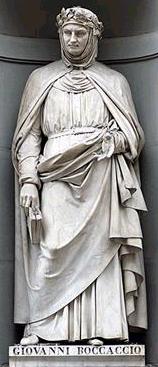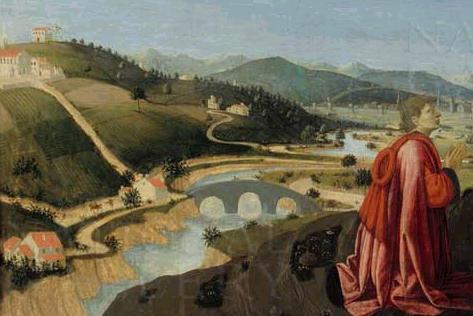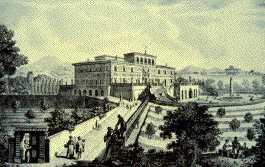
Candida Martinelli's Italophile Site

Main
Page This family-friendly site celebrates Italian culture for the enjoyment of children and
adults. Site-Overview
A statue of Giovanni Boccaccio from the Uffizi
Gallery promenade in Florence. The harsh-looking face softens as one closes in on
it, reflecting what was often written about the man during and after his
life, that he was a sensitive, wise, and kind man. Click on the illustrations, or
here, to
view pages from the Boccaccio, 'The Decameron', hand written in Italian,
from Italy, Ferrara; circa 1467, illuminated by Taddeo Crivelli for
Teofilo Calcagnini, now on-line at the Bodleian Library. The images of the storytellers and their
locations are reminiscent of children's books, but the stories were not
for children! Click on the above text, or
here, to go to a different online
version of 'The Decameron' in the original Italian. Click on the above images, or
here, to go to a wonderful
bi-lingual site about Gardens and Villas in Tuscany. This link is
to their page on 'Villa Schifanoia' which was built on part of the site
of Boccaccio's 'Villa Palmieri'. The image on the right is of
'Villa Schifanoia'. Click on the above image, or
here, to visit a lovely site for
Garden Tourists listing Italian gardens to visit. On the list is
'Villa Palmieri' which was made in 1870 on part of the site of the
Boccaccio's 'Villa Palmieri'.
In 1475 Villa Palmieri was depicted in a painting now in the National
Gallery in London. This capture is of the corner where Villa
Palmieri is shown at the base of the bridge, with Matteo Palmieri, a
Renaissance poet and the man who commissioned the painting, and owner of
the property, kneeling as witness to the 'Ascension of the Virgin'. This is an engraving of how Villa Palmieri looked in 1774. It was
completely renovated, including the gardens, soon after by the English
Crawford family. Click on the above text, or
here, to go to an online version
of 'The Decameron' in English. Free e-books of The Decameron at Project Gutenberg, the grand-daddy
of free e-book websites. My list of books by and about Boccaccio
at Amazon.com
To widen your search to the era and contemporaries of Boccaccio, you can use this search tool for Amazon.com. Just
enter 'Books' in the 'Search' field, and 'Boccaccio' in the 'Keyword' field.
Then click
on the 'Go' button to see what's available, what people's comments about
the books are, and what they cost. The
Influence of The Decameron In
his 62 years (b.1313-d.1375), Boccaccio was a prolific poet and
storyteller in Latin and Italian. He
was a close friend of the scholar/poet Petrarch, and a trusted emissary of the rulers of
his day. He lived at
various times in Naples, Florence, Venice, and Paris, where he was
actually born to his French mother as the illegitimate son of a Tuscan
merchant. His father’s
attempts to make him a merchant, and then a canon failed, and he finally
found his own way as a scholar, poet and writer of tales. It
wasn’t until his middle-age that he wrote the work still read and
enjoyed today, The Decameron.
The structure of the collection of often bawdy short stories
explains the title: the
book is divided into ten days during which each member of a group of ten
people tells one tale, so each day’s tales equal ten.
Each day, the group is given a theme by one of the storytellers
to which their stories must comply, such as infidelity, honor, avarice.
It was an outbreak of the plague in 1348 in Florence that
prompted Boccaccio to finally write the work for which he had long been
collecting material. The group of ten are actually in Fiesole above Florence to
escape the plague, and tell the stories to provide amusement during
their exile. Like
the poet Petrarch with his Laura, and poet Dante with his Beatrice, Boccaccio had his Fiammetta, his
poetical inspiration, and in his case, his lover and introduction
into court society. He featured her in many of his works, including The
Decameron. She is one of
the storytellers, and at the end of the Fourth Day he describes her
receiving the laurel wreath, the kingly symbol given to the person who
will decide the next day’s theme.
His description of her is most likely how Boccaccio lovingly saw
her, although I’m not too sure I’d like to be said to have “eyes in
her head that matched those of a peregrine falcon”.
It reads: ‘But
the king observing that the sun was now taking a yellowish tinge, and
that the end of his sovereignty was come, in terms most courtly made his
excuse to the fair ladies, that he had made so direful a theme as
lovers' infelicity the topic of their discourse; after which, he rose,
took the laurel wreath from his head, and, while the ladies watched to
see to whom he would give it, set it graciously upon the blond head of
Fiammetta, saying: "Herewith I crown thee, as deeming that thou, better
than any other, wilt know how to make tomorrow console our fair
companions for the rude trials of today."
'Fiammetta, whose wavy tresses fell in a flood of gold over her
white and delicate shoulders, whose softly rounded face was all radiant
with the very tints of the white lily blended with the red of the rose,
who carried two eyes in her head that matched those of a peregrine
falcon, while her tiny sweet mouth showed a pair of lips that shone as
rubies, replied with a smile: "And
gladly take I the wreath, Filostrato, and that thou mayst more truly
understand what thou hast done, 'tis my present will and pleasure that
each make ready to discourse tomorrow of good fortune befalling lovers
after divers direful or disastrous adventures."
‘ The
Decameron was one of the earliest printed books, the first edition
coming out of Venice in 1471.
Before it was printed, people paid to have it copied and illustrated for
their private libraries. But
early editions of the book are a rare find today, because most were
burned in Florence’s main square by the radical reform-mined preacher
Savonarola in 1497, about a year before he himself was burned there for
heresy, actually, for being a big pain in the behind to the rulers of
Florence and to the clergy. Early
English translations were edited of their bawdiness, just as early
editions of A Thousand and One Nights was stripped of its
licentiousness in early translations.
Only later did faithful translations appear.
But even before it was translated into English, English writers Chaucer and
Shakespeare borrowed generously from the work. The
group of storytellers stay in two villas above Florence which have been
determined to be Villa Palmieri in Fiesole, and the Podere della Fonte, or the so-called Villa del Boccaccio near
Camerata. Villa Palmieri is
open to visitors, and its gardens during Boccaccio’s time are
described in great detail in The Decameron at the beginning of Day Three. “Whereupon
they went to a walled garden adjoining the palace; which, the gate being
opened, they entered, and wonder-struck by the beauty of the whole passed
on to examine more attentively the several parts. 'It was bordered and
traversed in many parts by alleys, each very wide and straight as an arrow
and roofed in with trellis of vines, which gave good promise of bearing
clusters that year, and, being all in flower, dispersed such fragrance
throughout the garden as blended with that exhaled by many another plant
that grew therein made the garden seem redolent of all the spices that
ever grew in the East.
'The sides of the alleys were all, as it were,
walled in with roses white and red and jasmine; insomuch that there was no
part of the garden but one might walk there not merely in the morning but
at high noon in grateful shade and fragrance, completely screened from the
sun.
'As for the plants that were in the garden, 'twere long to enumerate
them, to specify their sorts, to describe the order of their arrangement;
enough, in brief, that there was abundance of every rarer species that our
climate allows.
'In the middle of the garden, a thing not less but much
more to be commended than aught else, was a lawn of the finest turf, and
so green that it seemed almost black, flanked with flowers of, perhaps, a
thousand sorts, and girt about with the richest living verdure of
orange-trees and cedars, which showed not only flowers but fruits both new
and old, and were no less grateful to the smell by their fragrance than to
the eye by their shade. 'In the middle of the lawn was a basin of whitest
marble, graven with marvellous art; in the centre whereof--whether the
spring were natural or artificial I know not--rose a column supporting a
figure which sent forth a jet of water of such volume and to such an
altitude that it fell, not without a delicious splash, into the basin in
quantity amply sufficient to turn a mill-wheel.
'The overflow was carried
away from the lawn by a hidden conduit, and then, reemerging, was
distributed through tiny channels, very fair and cunningly contrived, in
such sort as to flow round the entire lawn, and by similar derivative
channels to penetrate almost every part of the fair garden, until,
re-uniting at a certain point, it issued thence, and, clear as crystal,
slid down towards the plain, turning by the way two mill-wheels with
extreme velocity to the no small profit of the lord. 'The aspect of this
garden, its fair order, the plants and the fountain and the rivulets that
flowed from it, so charmed the ladies and the three young men that with
one accord they affirmed that they knew not how it could receive any
accession of beauty, or what other form could be given to Paradise, if it
were to be planted on earth.”
Below
is one story from the 100 stories in The Decameron. It is from Day 6, Story VII, and the theme was “by some
sprightly sally have repulsed an attack, or by some ready retort or device
have avoided loss, peril or scorn.”
Day
6, Story VII
There
was aforetime in the city of Prato a statute no less censurable than
harsh, which, making no distinction between the wife whom her husband
found in adultery with her lover, and the woman found pleasuring a
stranger for money, condemned both alike to be burned.
While
this statute was in force, it befell that a gentlewoman, fair and lovely
beyond measure, Madonna Filippa by name, was by her husband, Rinaldo de'
Pugliesi, found in her own chamber one night in the arms of Lazzarino de'
Guazzagliotri, a handsome young noble of the same city, whom she loved
even as herself.
And
Rinaldo, very angry, scarce refrained from falling upon them and killing
them on the spot; and indeed, only because he worried how he should
afterwards fare himself had he given way to the vehemence of his anger,
and so done, did he refrain from doing so. Even though he mastered
himself, he could not resist recourse to the statute, to accomplish that
which he might not otherwise lawfully accomplish, to wit, the death of his
lady.
So,
having all the evidence needful to prove her guilt, he took no further
counsel; but, as soon as 'twas day, he charged the lady and had her
summoned. Like most ladies that are veritably lovely, the lady was of a
high courage; and, though not a few of her friends and kinsfolk sought to
dissuade her, she resolved to appear to the summons, preferring to die
bravely confessing the truth than basely flee and for defiance of the law
live in exile, and show herself unworthy of such a lover as had had her in
his arms that night.
And
so, attended by many ladies and gentlemen, who all exhorted her to deny
the charge, she came before the Podesta, and with a composed air
and unfaltering voice asked of what he wished to interrogate her.
The Podesta, surveying her, and taking note of her
extraordinary beauty, and exquisite manners, and the high courage that her
words evinced, was touched with compassion for her, fearing she might make
some admission, by reason whereof, to save his honour, he must needs do
her to death.
But
still, as he could not refrain from examining her of that which was laid
to her charge, he said:--"Madam, here, as you see, is your husband,
Rinaldo, who prefers a charge against you, alleging that he has found you
in adultery, and so he demands that, pursuant to a statute which is in
force here, I punish you with death: but this I may not do, except you
confess; so be very careful what you answer, and tell me if what your
husband alleges against you be true."
The
lady, in no way dismayed, and in a tone not a little jocund, thus made
answer: "True it is,
Sir, that Rinaldo is my husband, and that last night he found me in the
arms of Lazzarino, in whose arms for the whole-hearted love that I bear
him I have often lain; nor shall I ever deny it; but, you as well as I
know, the laws ought to be common and enacted with the common consent of
all that they affect; which conditions are wanting to this law, inasmuch
as it binds only us poor women, in whom to be free with our love is much
less reprehensible than it were in men; and furthermore the consent of no
woman was--I say not had, but--so much as asked, before 'twas made; for
which reasons it justly deserves to be called a bad law.”
“However,
if in defiance of my body and your own soul, you are minded to put it in
force, 'tis your affair; but, I pray you, do not proceed to try this
matter until you have granted me this trifling grace, to wit, to ask my
husband if I ever denied him, but did not rather accord him, when and so
often as he craved it, complete enjoyment of myself."
Whereto
Rinaldo, without awaiting the Podesta's question, answered that
assuredly the lady had always granted him all that he had asked of her for
his gratification. "Then," promptly continued the lady, "if
he has always had of me as much as sufficed for his solace, what was I or
am I to do with the surplus? Am
I to cast it to the dogs? Is
it not much better to bestow it on a gentleman who loves me more dearly
than himself, than to suffer it to come to nought or worse?"
Which
jocund question being heard by well-nigh all the folk of Prato, who had
flocked there all agog to see a lady so fair and of such quality on trial
for such an offence, they laughed loud and long, and then all with one
accord, and as with one voice, exclaimed that the lady was in the right
and said well; nor left they the court until in concert with the Podesta
they had so altered the harsh statute so that thenceforth only such women
as should wrong their husbands for money should be within its purview.
And
Rinaldo left the court, discomfited of his foolish enterprise; and the
lady blithe and free, as if rendered back to life from the burning, went
home triumphant.
Sources:
Various including those hyperlinked on this page, and Boccaccio's
The
Decameron translated by J. M. Rigg, available from Project
Gutenberg,
and a link on this page. Visit my Garden
Inspirations page

Boccaccio
and The Decameron, The full text, History...
![]()




Introduction
The
Decameron
Fiammetta,
his Muse and Lover
The
Influence of The Decameron
The
Garden of Villa Palmieri
A
Story from The Decameron